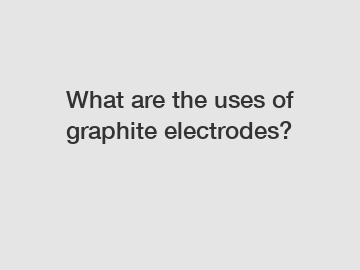What are the uses of graphite electrodes?
What are the uses of graphite electrodes?
Graphite electrodes play a vital role in various industries due to their unique properties and versatility. From electric arc furnaces to chemical processes, these electrodes are indispensable. But what are the specific uses of graphite electrodes, and why are they so essential? In this article, we will delve into the multiple applications of graphite electrodes, explaining their significance in each domain.
1. Electric Arc Furnaces (EAFs):

Graphite electrodes are primarily used in EAFs for steel production. These furnaces operate by melting scrap steel using a high-powered electric arc. Graphite electrodes serve as conductive materials in this process, providing the electrical current required for the arc. Through their excellent thermal conductivity and high melting point, graphite electrodes can withstand the extreme temperatures generated and sustain the electric arc, ensuring efficient melting of the steel.
2. Metal Refining:
Graphite electrodes also find extensive use in metal refining processes, such as the production of ferroalloys, copper, and aluminum. In these operations, graphite electrodes are employed to create an electric arc, facilitating the reduction or oxidation of metals. The electrodes act as both conductors of electricity and reactants, thereby enabling efficient metal refinement. The properties of graphite, including its low reactivity and resistance to thermal shock, make it an ideal choice for these applications.
3. Chemical Processing:
In the realm of chemical processing, graphite electrodes are indispensable. They are commonly utilized in electrolysis cells for the production of chlorine, sodium hydroxide, and other chemicals. These electrodes provide the means to carry out electrochemical reactions by conducting electricity through an electrolyte. The high electrical conductivity and chemical stability of graphite enable the efficient conversion of chemical compounds, making it an ideal material for this process.
4. Energy Storage:
Graphite electrodes also play a crucial role in energy storage systems, particularly in lithium-ion batteries. These electrodes are utilized as the anode, providing a conductive matrix for lithium ions during the charging and discharging cycles. The high surface area, excellent electrical conductivity, and stability of graphite make it an optimal material for this application. The widespread use of lithium-ion batteries in various portable electronic devices and electric vehicles further emphasizes the essential role of graphite electrodes in our daily lives.
In conclusion, graphite electrodes possess a wide range of applications due to their unique properties. Whether it is for steel production, metal refining, chemical processing, or energy storage, these electrodes are instrumental in various industries. Their ability to withstand high temperatures, excellent electrical conductivity, and chemical stability make them ideal for numerous industrial processes. As technology advances and new applications emerge, the demand for graphite electrodes is expected to grow. So, the next time you come across the question "What are the uses of graphite electrodes?" remember their significance in shaping the modern world.
If you are looking for more details, kindly visit cangshun, graphite electrode uses, Petroleum coke carburizer.

Comments